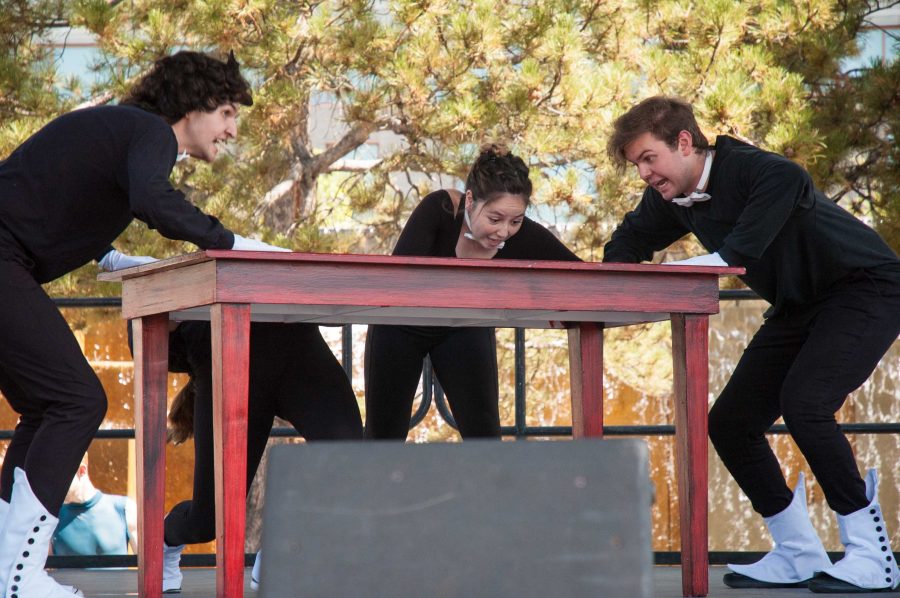Chess: a somewhat antiquated game that producers often featured in their movies when trying to create an air of sophistication. Now it is also known as a jukebox musical featuring ABBA, opening Sept. 14 in the Marriott Center for Dance at the University of Utah.
“Chess” is a musical set nearly 75 years ago. It loosely tells the story of the 1945 radio chess world championship. Now, you might be thinking along the same lines as the musical theater department head Denny Berry: “What could possibly be interesting about watching people think?” Chess is an intellectual game after all, but everything changes when you look at the context.
1945 is right at the beginning of the Cold War. Oh, and the musical focuses on a really important chess match? It’s between the USA and the USSR. Though maybe watching people think under intense political pressure is a little more interesting than viewing an ordinary chess game, but ABBA, who wrote the score for “Chess,” is not particularly known for their patriotic music. If you have seen either of the “Mamma Mia” movies, you might have noticed that they aren’t exactly propaganda. Well, “Chess” definitely has more politics than “Waterloo,” but at its heart this is a show about love of country, people and profession.
This show deals with emotional struggles on a variety of spectrums, both personally and politically. I think this show will speak to its audience in a way that it never has before. It paints humans as just this: humans. “Chess” does not make every person of one nationality act aggressively or rudely, but displays a wide array of personalities. This allows the audience to make judgments based on the moral choices of individual characters rather than on nationalities.
Cameron Holzman plays the Russian grandmaster Anatoly Sergievsky. Sergievsky is the face of the USSR, where he faces intense pressure to win on all sides. However, Sergievsky finds something unexpected when he arrives to meet his opponent Freddie Trumper. The surprise is Florence Vassy — Hungarian-born, English-raised — who is entirely confused about where she stands, although she knows she is supposed to stand behind Freddie as his manager.
Suddenly, viewers aren’t just watching people think, but are also watching characters panic, crack and make the wrong choices with a lot at stake. When Berry, the director, first considered this musical for the 2018-2019 season, she “was really intrigued.”
“I loved the ideas behind it, I loved so much of it, but it just didn’t really work. And they’d tried it so many times and there’s always something missing. In the preface to the play [‘Chess’] Tim Rice says ‘it’s never worked,’ but there’s so much of this material and the story is so completely different between the West End version and the New York version. There’s a lot of potential and so it’s fun to revisit those productions and see if you can’t clarify the story line. And it’s fun to work with such incredible material,” she said.
Berry, the department head, explains, “It’s always been a goal of mine to find a niche where the U of U program can live.” She would prefer this niche be new works, but when this proved nearly impossible, she redirected her energy to reviving problem shows. Barry picks musicals that had short runs or problematic scripts and then works with actors and designers alike to figure out the solution. For her, the department doesn’t encourage empty performance — it teaches problem solving and creative storytelling. A perfect example of this is last year’s production of “The Beautiful Game,” which performed a never-before-seen altered script with permission from Andrew Lloyd Webber himself.
“Chess” required more than a few line edits. The first problem the production and direction team faced was which story to tell. Between the war, the romance and the game there were a lot of frames to look through. Barry narrowed it down and started from the beginning. The game became her sole focus, and she and the cast learned everything they could about playing chess. Holzman said, “We play out real, famous chess games from past championships and matches. It was incredibly interesting to delve into the psyche of these men through the chess games. Every move we make has been analyzed and every repercussion and option observed.”
Once they had mastered the game of chess, the cast turned their eyes and ears towards the music under the direction of Alex Marshall. Marshall looked at the show as a brilliant but inconsistent score. “When you see ‘Chess’ you see it in concert. People like the music, it’s great music, but they lose the story line. There are these holes.” He focused on recentering the sound of “Chess” around the rock vibes of ABBA and worked to clarify the noise of excess notes or musical phrases. Marshall has worked on many shows at the U, often directing with only a small onstage orchestra.
“Chess” is one of those musicals that will whisk you away in its drama and set you down again leaving you not quite sure how to feel. It showed in concert a few years ago at Pioneer Theatre with a sold-out run. Whether you love chess, ABBA is your soul or you’re a history buff, “Chess” is worth watching, and this edition promises to be better than ever.
Get your tickets to “Chess” Sept. 14-23, free with a student ID. You can pick them up at the Kingsbury Hall box office or snag one day of at the theater. This show is where you’ll want to be, so don’t miss it.


